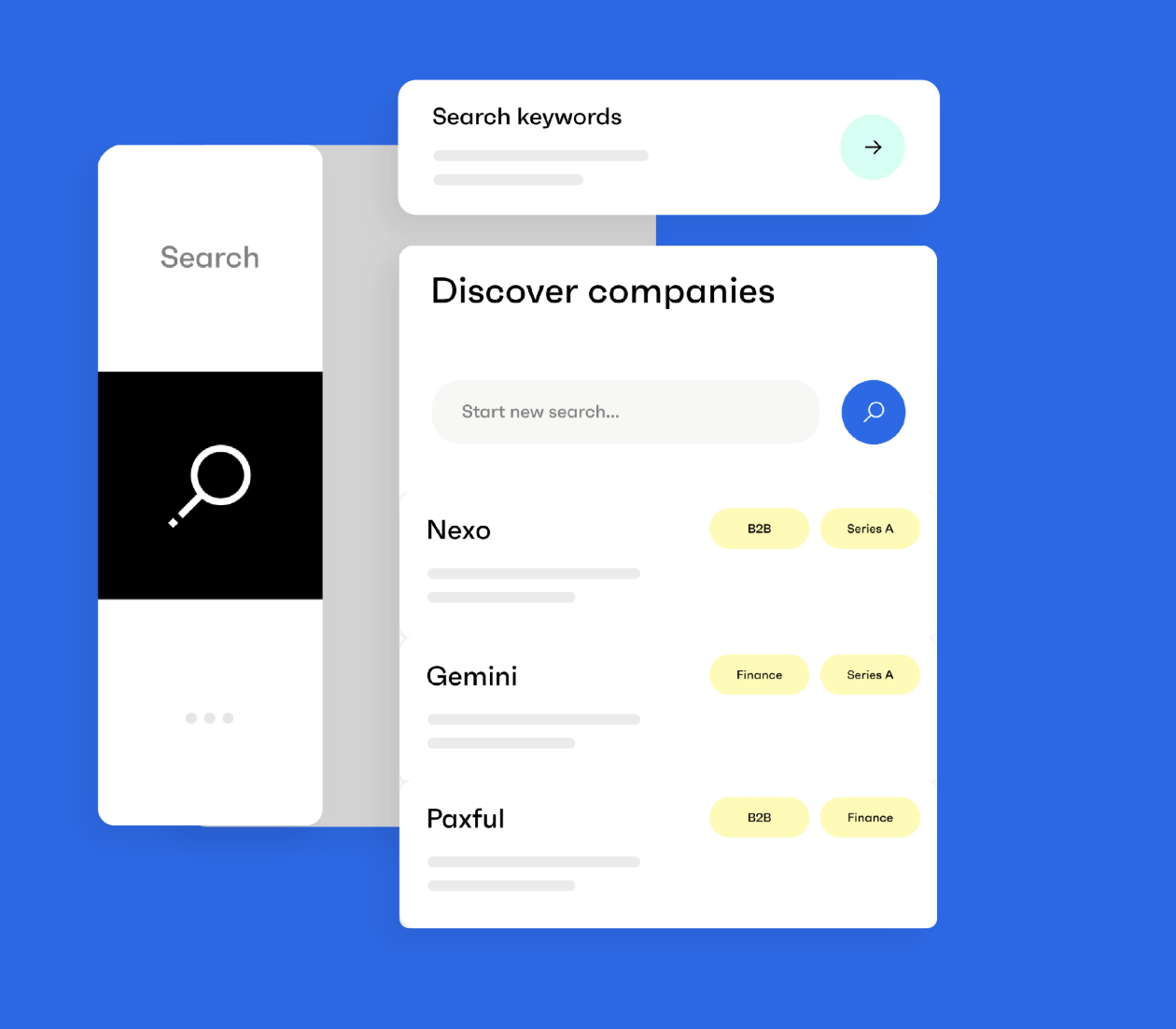There's no way around it — proprietary M&A deal sourcing can give you an edge in discovering unique deals that few others are competing for.
There are several reasons firms prefer to source their own M&A deals instead of relying exclusively on intermediaries and advisors. That could be to diversify M&A deal sources, save money, or even carve out a unique business niche.
Whatever the reason, if you’ve already nailed down the basics of proprietary M&A deal sourcing, it's time to move on to more advanced M&A deal origination tactics.
As Simon Blackburn, a senior M&A partner at McKinsey put it, "It's not enough to have a digital strategy. You need a strategy that's robust in an age of digital disruption."
These M&A deal origination methods will help your company stay ahead of the curve and find deals that nobody else knows are out there.
Key Takeaways
- What is M&A deal sourcing and origination? The process of searching, matching, and identifying deal opportunities.
- Why does it matter in 2025? In today's highly competitive market, proprietary strategy for M&A deal sourcing is non-negotiable. Being first to the deal can make or break transactions.
- What creative strategies can be utilized for deal sourcing M&A? Leverage social media like LinkedIn for brand-building and thought leadership to expand your network. Niche down in your target industry and become an expert.

What Is M&A Deal Sourcing and Origination?
M&A deal sourcing and origination refers to the first phase in which prospective investors search for potential opportunities. It is the process of matching and identifying opportunities to get the best deal possible.
One of the main features of M&A sourcing is finding contacts and building relationships with M&A intermediaries. These activities serve to ensure that the entire process of deal sourcing runs smoothly, but also that the deal is executed in a way that achieves the desired outcome for both parties.
As part of the early stages of the M&A transaction process, the deal sourcing workflow may vary from company to company. Some companies manage their deal sourcing strategy in-house using software tools while others enlist external firms such as investment banks or consultants to leverage their deal-finding expertise.
In today’s competitive environment, more and more firms are choosing to explore proprietary M&A deal sourcing strategies. When executed properly, a proprietary strategy can yield better outcomes like lower transaction costs and higher ROI.
Why? Because a proprietary strategy (built from exclusive and accurate data) often means getting to the deal first. Establishing a proprietary deal sourcing strategy is an excellent foundation for finding and closing an M&A deal, regardless of size or complexity.
How it Works: The Process of M&A Deal Sourcing
If you want your M&A deal sourcing process to achieve its goals, you need a strategic approach from the outset. This approach begins with identifying and pursuing potential acquisition opportunities.
It is considered best practice to start the M&A process with an accurate market assessment. During this step, your team must conduct a thorough analysis of market conditions. Key questions at this stage include:
- What is the overall size of the market?
- What are the precedent transactions, and how much does it cost to transact in the market?
- Who is doing deals: investors or corporates?
- What are accurate public and private comps?
It is also important for your M&A deal sourcing team to accurately identify macroeconomic trends, threats, and risks that may jeopardize the investment. Once the market hypothesis is confirmed, the business development team can explore potential targets and engage with business owners. When a mutual fit is found, both parties sign a letter of intent (LOI), which signifies the acquirer’s intent to proceed with a financial transaction, pending thorough due diligence and negotiations, often involving lawyers and accountants.
The main objective of this process is to strategically engage the right targets, where the investor stands a higher chance of reaching their desired outcome. Company intelligence software tools, relationships, and first-party data — often stored in a customer relationship management system (CRM) — play a crucial role in determining the right firms to engage at this pivotal early stage.
Challenges in M&A Deal Sourcing
When it comes to sourcing and originating M&A deals, quality data has always been the name of the game. But private markets are notoriously opaque, and without the proper tools, dealmakers often run into hurdles.
Private companies in the United States aren’t required to publicly report on their financials, and it’s only marginally better across the pond. Different countries have different reporting requirements depending on company size and revenue, leaving blank spots for dealmakers. The limited private market data that is available is often fragmented, outdated, or inaccurate.
Finding the right tools to filter out the noise can also be a challenge. For example, company databases lack the depth needed for investment workflows. Meanwhile, generic large language models (LLMs) like ChatGPT lack the specificity, accuracy, and analytical capabilities that dealmakers need to win the private market.
At best, these obstacles produce clunky, time-consuming workflows. At worst, they slow down the dealmaking process and cause private market investors to lose out on opportunities. But there are better ways to source and originate M&A deals. With the right strategies, and with a private market platform like Grata, you can find the best deals before your competitors.
Advanced Deal Sourcing Strategies & Tactics for M&A
Businesses are built on relationships. But, in order to beat your competitors and be the first to the deal, you have to go beyond the basics. Consider using more advanced M&A deal sourcing strategies and tactics.
Advanced M&A deal sourcing strategies involve integrating innovative technologies, first-party data, as well as relationships to increase the probability of doing a deal. Having more accurate and recent data on your market and target companies can give you an edge, just like having well-established relationships with bankers, service providers, and industry experts.
One of these advanced strategies is the use of social media, especially LinkedIn. Leveraging social media platforms expands contracting opportunities by expanding your network. LinkedIn is the ideal platform for businesses and individuals to build a brand through thought leadership. If your online personality becomes synonymous with transacting in a particular industry, you will have established a new channel for inbound M&A deals.
Dealmakers can also leverage tools like the Grata Deal Network, which allows them to connect directly with advisors over live mandates — often before they hit the market.
Another advanced M&A deal sourcing strategy is partnerships. Think of these partnerships as networking, but more intentional and targeted. Working with partners and industry experts helps to broaden horizons, uncover new information, and begin fruitful relationships with potential targets.
Personal strategies, like attending industry-specific conferences, foster trust and lasting impressions with the people who matter most, but are time-consuming to put into practice. The growing trend of proprietary sourcing, however, empowers firms to search for qualified opportunities autonomously, using a variety of intelligent and AI-powered tools.
Even with advanced strategies, the process of deal sourcing is still quite complex. To navigate it, you may want to consider integrating multiple strategies, as well as a holistic approach to achieve the best possible results.
Thematic M&A Deal Sourcing
It's easy to feel overwhelmed with the sheer level of M&A deals your company could potentially source. Instead of flitting from industry to industry, consider niching down and becoming a specialized industry expert. Not only does this allow you to build a community, but it often offers higher returns as well. Limited partners and investors tend to prefer this approach.
You shouldn't necessarily choose a singular theme or industry forever, but you can build up a cachet among a handful of industries over time. You may have a hard time finding deals in your target industry and size — that's when a private market platform like Grata comes in handy. With its AI search tool, you can quickly find specific company details and directly access contact information for key stakeholders.
Predictive Signals in M&A Deal Sourcing
In business, timing is everything. When you're researching potential deals, it's worth finding out information such as:
- Is the company growing?
- Is the company shrinking, or does it need capital?
- Is the company going to raise a round of funding soon?
- Are they expanding, or entering a new phase of their journey?
- Are they hiring for roles that signal their interest in being acquired?
- Has leadership changed recently?
- Has the founder/owner hit retirement age?
- Is the company doing acquisitions?
Uncovering these predictive signals will help you to better-qualify leads and close deals faster.
Proprietary Data
In one Accenture study, 97% of respondents said that proprietary data was "very valuable" or "quite valuable" to differentiate the company from competitors.
Proprietary data offers a powerful source of information that enables your company to find better M&A deals even faster. The more data you collect, the more insights you have.
Building customer personas is a tried-and-true market research method that works for all types of companies. Software like Gong offers a great opportunity to collect qualitative data from current prospects and customers.
Unfortunately, collecting proprietary data from phone calls and meetings doesn't help companies find new deals. For that, you need a way to get it from outside in. As Forbes Insights shares, there are a few primary ways to hack together your own proprietary data:
- Scraping – Collecting publicly available (but scattered) data
- Partnering – Exploring partnerships between different established companies to uncover new information
- Crowdsourcing – Asking internal teams to collect data or outsource the work
Dig deeper for industry-specific data sources, or look for nuanced tags that tell you more about a company. Any details might help you fill in the blanks and get a better understanding of where you can find new prospective clients.
Similar Companies
Which companies have you invested in with success? Are they in a specific industry, do they have a specific employee size, or are they at a certain company stage or funding round? Break out all these pieces so you can develop a strategy that targets similar companies. Over a short period, this can save your company market diligence time, with less time to close and an increased chance of closing.
Just look at Pineland Capital Partners. When digging into a list of 20,000 companies on Grata, one fire protection company emerged as a potential target. Though not initially on Pineland's target list, founding partner Matt Rainwater made a pivotal call to the company two days later. "I spoke with the company owner and got a deal done. It was the first deal that Pineland closed, thanks to Grata," Matt said. "I can't work without it—it has become a part of our day-to-day operations.”
M&A List Expanding
Chances are, if the company is listed in some kind of media, competitors are already looking at it. For the most cutting-edge proprietary M&A deal sourcing, you'll need to discover companies before everyone else does.
Take an industry list of companies and find similar companies that have a less visible (or no) media presence. You may find this list from conferences, industry organizations, blogs, or other data sources.
Here are some other creative ways to expand your list:
- Try Facebook's lead ads
- Host or sponsor webinars
- Create free online courses
- Offer downloadable content, like whitepapers
- Use Google ads for targeting
- Conduct industry surveys
Whichever niche you decide to target, taking deals into your own hands will open up a wealth of opportunity that will build on itself over time. Gathering accurate M&A information and building long-term relationships are the most important investments you can make in your company.
Supercharge Your M&A Deal Sourcing with Grata
Grata has the coverage, data depth, and comprehensive workflows that private market dealmakers need — all in one sleek, user-friendly platform.
Grata’s powerful AI search enables you to find private companies by strategic fit: what they do, how they’re positioned, and the markets they target. Learn about how we’re changing the game for dealmakers around the world here.
Ready to up your sourcing and origination game? Schedule a demo here to get started.










.png)

